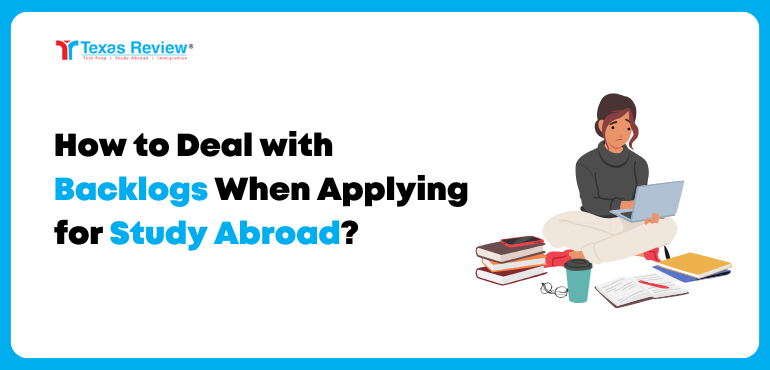
Backlogs can be a significant concern for students aiming to pursue higher studies abroad. However, it is essential to understand that backlogs, while challenging, are not necessarily the end of your academic aspirations. By addressing them strategically, you can still secure admission to reputable universities and enjoy a fulfilling educational journey.
In this article, we explore how backlogs affect your chances of studying abroad, provide actionable tips to handle them, and highlight strategies to enhance your applications.
What are Backlogs and How Do They Affect Applications?
Backlogs occur when you fail to pass a subject or module within the stipulated timeframe of your academic program. Universities assess your academic performance to determine your potential as a candidate, and backlogs can raise concerns regarding your consistency or grasp of subject matter.
However, it is important to note that:
- Universities Understand Challenges: Many universities recognize that academic setbacks happen and are often willing to assess the overall improvement in your academic record.
- Quantity Matters: A few backlogs may not have much of an impact, whereas numerous unresolved or “dead backlogs” (those you have failed to clear before graduation) can hinder your admission chances.
- Placement Considerations: While some employers might be reluctant to consider candidates with unresolved backlogs, successful course completion and consistent improvement can mitigate their impact.
To proceed successfully, the first step is understanding how backlogs influence higher studies abroad.
Do Dead Backlogs Affect Placement and Admission?
Dead backlogs can have varying implications depending on the university, program, and country of application. Some universities maintain a strict “no dead backlog” policy, while others assess the candidate’s broader achievements, skills, and potential. Countries like Canada, the U.S., and Australia are generally flexible if students can explain their backlogs and provide evidence of improvement.
Visa Application with Backlogs:
Your student visa application might require university acceptance proof. Since unresolved backlogs might affect this, it’s crucial to secure admission from universities accepting your profile. Aim to strengthen your overall profile through compelling statements of purpose (SOP), solid recommendation letters, and relevant experience to counterbalance the backlog issue.
Universities That Accept Backlogs
Several universities worldwide have policies accommodating students with backlogs. The acceptance depends on factors like:
- Number of Backlogs: Universities often set a limit on how many backlogs they accept.
- For example, institutions in countries like Canada and the UK may allow up to 5-8 backlogs, while others are more lenient.
- Reason for Backlogs: Genuine reasons, such as health issues or personal challenges, can be explained in your statement of purpose (SOP).
- Clearing Backlogs: If you’ve cleared your backlogs, mention this positively in your application to showcase resilience.
Several reputable institutions accommodate students with backlogs, provided they meet other criteria:
- United States: The U.S. offers opportunities at universities such as Purdue University Northwest and University of Bridgeport, even for students with limited backlogs.
- Canada: Canadian colleges like Thompson Rivers University and Cape Breton University consider applicants with up to 5 or 6 backlogs in some cases.
- Australia: Australian universities like Deakin University and Federation University are known for their flexible policies towards backlogs.
- United Kingdom: In the UK, institutions like Middlesex University and Northumbria University provide chances for students with backlogs.
When targeting these universities, it’s vital to focus on presenting a strong application.
Impact on Visa Applications with Backlogs
Visa applications can be influenced by academic backlogs. Immigration authorities typically review your academic transcripts, along with your admission offer and financial documentation. Here are some tips to navigate visa applications with backlogs:
- Provide Justification: Clearly explain the reasons for your backlogs in your SOP. Be honest and detail the steps you took to overcome the challenges.
- Show Improvement: Highlight significant academic progress after backlogs were cleared.
- Prepare Documentation: Ensure all necessary documentation, including transcripts, backlog clearance certificates, and admission offers, is in order.
By proactively addressing backlogs, you can demonstrate determination and competence, which are qualities valued by immigration officials and universities alike.
Tips to Deal with Backlogs When Applying for Studying Abroad
While past backlogs can seem daunting, the right approach can help minimize their impact:
- Be Honest: Acknowledge backlogs in your SOP and highlight the lessons learned and your academic growth.
- Show Improvement: Demonstrate consistent progress through better grades and a strong trajectory.
- Upskill with Courses: Take certifications, internships, or projects to showcase expertise in your field.
- Secure Strong Recommendations: Letters from professors or employers can reinforce your strengths and commitment.
- Research Universities: Apply to institutions with policies aligned with your backlog count and status.
- Clear Backlogs: If possible, retake and clear backlog exams to strengthen your profile.
- Score High in Tests: Strong GRE, GMAT, or TOEFL scores offset backlog concerns and prove academic potential.
- Highlight Extracurriculars: Showcase your achievements in activities outside academics to present a well-rounded profile.
Advice for Students with Backlogs
As a student dealing with backlogs, keep these additional tips in mind:
- Plan Strategically: Choose universities that are known to consider profiles with backlogs. Avoid those with rigid academic requirements.
- Stay Persistent: Focus on retaking and clearing any remaining backlogs as soon as possible to enhance your academic record.
- Develop Skills: Engage in skill-building activities, such as certifications, workshops, or internships, to enhance your profile.
- Consult Experts: Work with academic counselors or study-abroad advisors to select the best universities and present a compelling application.
What Not to Do
When addressing backlogs, avoid these common mistakes:
- Underplaying Their Impact: Instead of brushing them off, acknowledge backlogs while shifting focus to your strengths.
- Exaggerating Circumstances: Stick to genuine explanations in your SOP. Authenticity builds trust.
- Failing to Communicate Growth: Universities value growth. Showcase a clear timeline of how you improved academically.
Key Takeaways
Studying abroad with backlogs is not an impossible feat. With diligent preparation, a strong academic recovery, and strategic planning, you can overcome this hurdle. Focus on showcasing your strengths, learning from past mistakes, and using them as stepping stones toward a successful international education experience.














